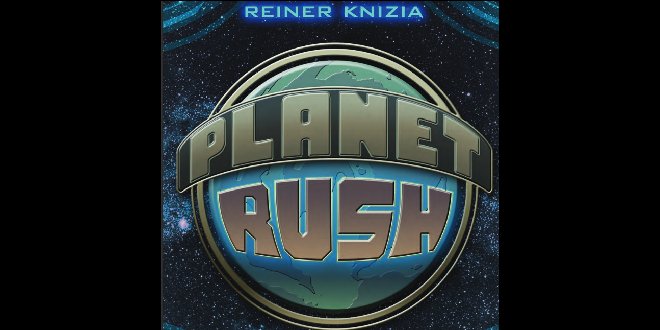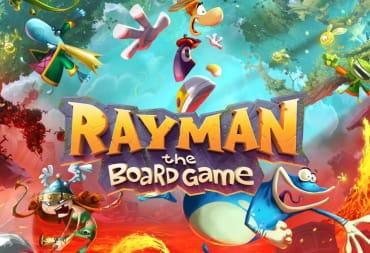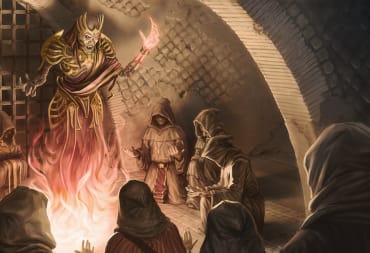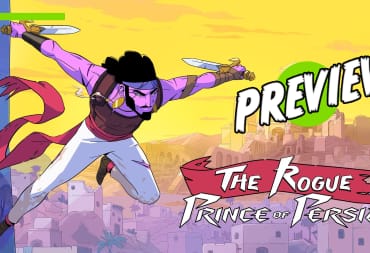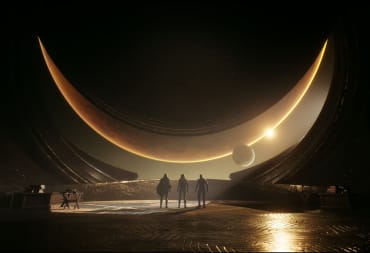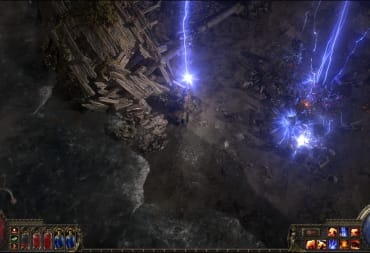Update: Victory Point Games has decided to cancel the Planet Rush Kickstarter in favor of producing the game in-house and offering it through their webstore in the near future instead.
Welcome to Zenobia. You are your corporation's representative on this untouched, resource rich planet. Your job is simple: gather up resources and help colonize the planet by building the structures necessary for your corporation to control the planet. Your competitors are here as well, but you should easily be able to outmaneuver and outsmart them, and you shouldn't have any trouble tricking them into helping you amass the most wealth. Does that sound simple enough?
Planet Rush, designed by Reiner Knizia, and currently being Kickstarted by Victory Point Games, truly does sound simple enough. There is very little setup, a small number of components, and a very small number of rules and mechanics to the game. Each player controls a faction that has its own mat that is really only a scorecard, some tokens in their color, and begins the game with a small hand of Resource cards and a single Faction Negotiation card. On each player's turn they can either draw another Resource card from the deck or attempt to construct one of the segments on one of the game's 8 structures. If you draw a card, play simply passes to the next player.
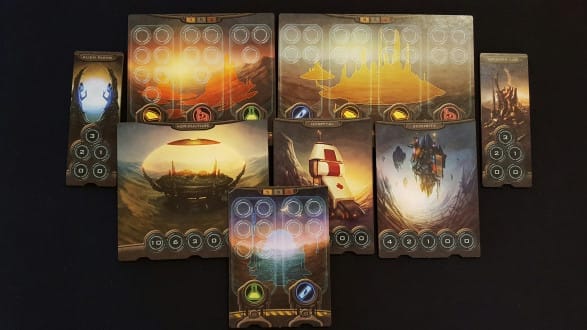
It's in the construction, or attempted construction, of the different segments where Planet Rush shows it's depth. A player can simply wait until they have all of the required Resources to build a segment themselves, but, usually, those opportunities are few and far between. You see, when a player decides to attempt construction, every other player can offer a bid of their own Resources to assist in the construction. The active player can choose to accept or deny any of the bids in order to accrue the exact number of resources necessary for the construction. Again, so far, so simple.
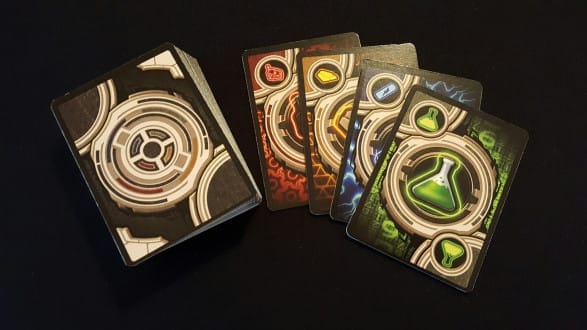
The first layer of depth comes to life as the bidding players try to convince the active player that their bid is the most attractive. Once the last segment of a structure is constructed, it is flipped over, and players score bonus points based on how many resources they contributed to the overall construction, and so every bit of contribution can lead to potential points for the bidding players. Because of this, it's important for the active player to pay attention to those contributions because, like the bidding players, the active player is also gunning to be the biggest contributor and secure those points.
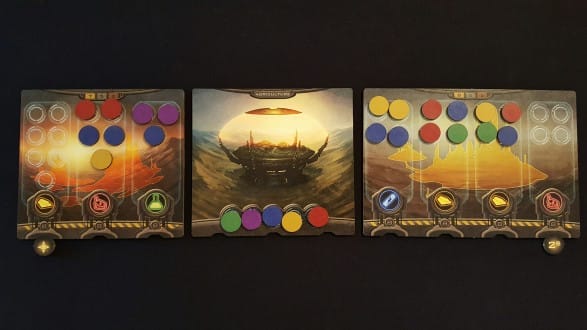
The second layer of depth comes from the Bonus counters and Faction Negotiation cards. If the active player accepts normal bids, or constructs a segment themselves, they claim the Bonus counter associated with that section. Any players whose bids were accepted don't get a bonus, but they do get to place their own tokens on the segment to represent their contribution. When players bid, they can, as part of their bid, include their Faction Negotiation card, which let's the active player count the contribution from the bid as their own. The bidding player gives up their contribution but gets the Bonus counter instead.
The Bonus counters can be quite lucrative, so the decision between bids isn't always straightforward. On top of that, savvy players who are paying attention can attempt to influence the overall outcome. When players bid, before any bids are revealed, players can lay down any number of cards from their hands. It isn't until the bids are revealed that cards that don't match the required resource are taken back out of the bid. This is effective for both hiding your total bid and for feeling out what the other players have in their hands, and you can use that information to decide when to offer your Negotiation card for a Bonus that you'd like to have. You can even use that information, or take a wild guess and hope it pays off, to offer a bid that is too big, effectively shutting down that construction effort entirely by offering a bid that is too large.
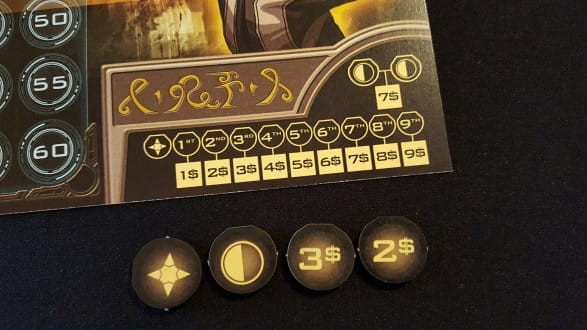
That last bit may seem counter-intuitive, but when played properly, can be quite effective. Each segment can only be constructed with the exact number of resources required. If you can acquire solid enough intel about the other bidders' cards, and you have a plethora of a particular resource, you can offer more than a player will accept, or even more than they can accept, shutting them down entirely. More often, though, that information can be used to tell you when you can effectively slip your Negotiation card in and snatch up a valuable Bonus.
The game ends once seven of the eight structures have been built, and bonus points are awarded for the total number of structures that a player has contributed to. This motivates players to try to both contribute as much as they can to a single structure and to try to contribute to as many structures as possible, which are essentially conflicting goals. It always feels as if you can't quite get all of the resources that you'd like, which plays into the bidding aspect of the game wonderfully, further encouraging Planet Rush's excellent player interaction.

Planet Rush's simple rules belie the amount of strategy the game contains. Turns fly by between players with essentially zero downtime as each player simply draws a card, or involves all of the other players in the bidding process. What, at first blush, appears to be a straightforward bidding and resource collection game quickly reveals itself as a cunning, conniving game of politics and bluffing as players form strategies, attempt to outbid each other, and even attempt to sabotage the construction efforts of the other players. Planet Rush is a great gateway game because it is so easy to teach and keeps all players constantly engaged, but it fits especially well with a group of players that like to try to outmaneuver, outguess, and outplay each other.
The pre-production copy of Planet Rush used for this preview was provided by Victory Point Games.
Previews you can trust: To ensure you're getting a fair, accurate, and informed review, our experienced team spends a significant amount of time on everything we preview. Read more about how we review games and products.
Have a tip, or want to point out something we missed? Leave a Comment or e-mail us at tips@techraptor.net
